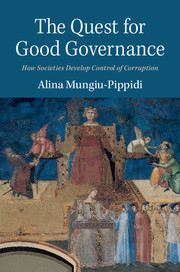Book contents
- Frontmatter
- Colophon
- Contents
- List of figures
- List of tables
- List of abbreviations
- Acknowledgments
- 1 Understanding control of corruption
- 2 Diagnosis and measurement
- 3 The road to Denmark: historical paths to corruption control
- 4 Structure and agency: determining control of corruption
- 5 Understanding contemporary achievers
- 6 Domestic collective action capacity
- 7 International agency and its anticorruption impact
- 8 From critical mess to critical mass: some tentative policy conclusions
- Appendix 1 Explaining bribery
- Appendix 2 List of variables and sources
- Appendix 3 Brief description of databases and surveys used
- Appendix 4 Impact of anticorruption interventions on control of corruption: bivariate regressions
- Appendix 5 HDI differentials from Figure 4.1
- Appendix 6 Classification of countries by governance orders
- References
- Index
5 - Understanding contemporary achievers
Published online by Cambridge University Press: 05 September 2015
- Frontmatter
- Colophon
- Contents
- List of figures
- List of tables
- List of abbreviations
- Acknowledgments
- 1 Understanding control of corruption
- 2 Diagnosis and measurement
- 3 The road to Denmark: historical paths to corruption control
- 4 Structure and agency: determining control of corruption
- 5 Understanding contemporary achievers
- 6 Domestic collective action capacity
- 7 International agency and its anticorruption impact
- 8 From critical mess to critical mass: some tentative policy conclusions
- Appendix 1 Explaining bribery
- Appendix 2 List of variables and sources
- Appendix 3 Brief description of databases and surveys used
- Appendix 4 Impact of anticorruption interventions on control of corruption: bivariate regressions
- Appendix 5 HDI differentials from Figure 4.1
- Appendix 6 Classification of countries by governance orders
- References
- Index
Summary
The search for control of corruption determinants across present countries and historical achievers has so far returned some pieces of a very complex puzzle to their rightful place. It is time now to pursue this investigation across the last set of cases in this book: contemporary achievers. To what extent do countries that have progressed since World War II seem to replicate the paths taken earlier by historical achievers? To what extent is the contemporary equilibrium described in the previous chapter discernible in and relevant to these new evolutions?
Examples of recent achievers are not only hard to find, but are rarely agreed upon. What may appear from the outside as a significant achievement for a country in controlling corruption is seldom perceived as such by the people living there. The sustainability of these achievements is also difficult to judge. How many years, electoral cycles, or favorable corruption ratings are needed before a country is considered to have passed the point of no return into sustainable control of corruption (assuming such a point exists – Italy is one example of back and forth movement)?
In the case of the oldest “contemporary achievers” such as Chile or Botswana, it has long been perceived that they are faring better than their neighbors. Even in these cases, however, more recent evolutions are not entirely positive. It is hard to suppress pessimism even in relation to the most successful examples of transitions to control of corruption, and locals always remind external researchers that definitions of “success” when it comes to corruption control are mostly based on the views of foreign experts with a pro-market and pro-business bias. It is difficult not to agree with them when considering Rwanda, which has risen in all World Bank charts to a level superior to Bulgaria and Romania, but whose last presidential elections returned the incumbent with 95 percent of the vote and whose government party owns companies bidding on public contracts (and winning many of them) (Bozzini 2014).
- Type
- Chapter
- Information
- The Quest for Good GovernanceHow Societies Develop Control of Corruption, pp. 130 - 160Publisher: Cambridge University PressPrint publication year: 2015



